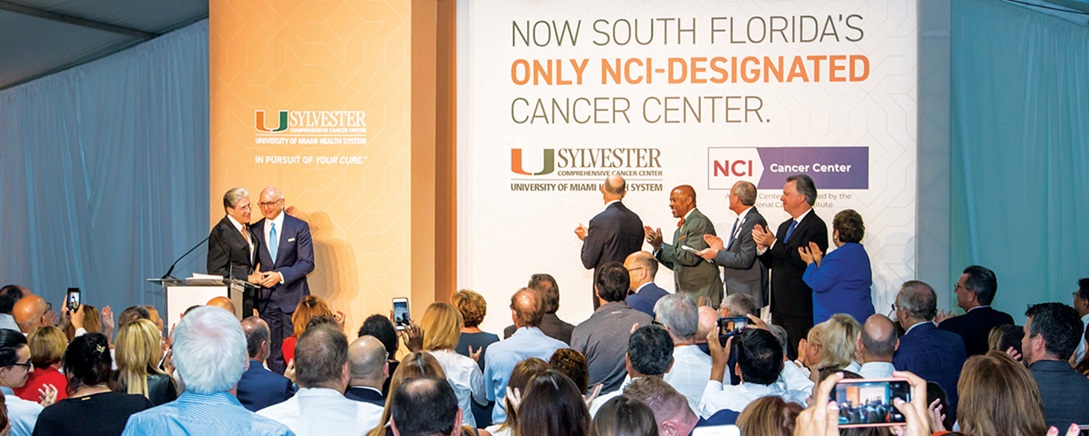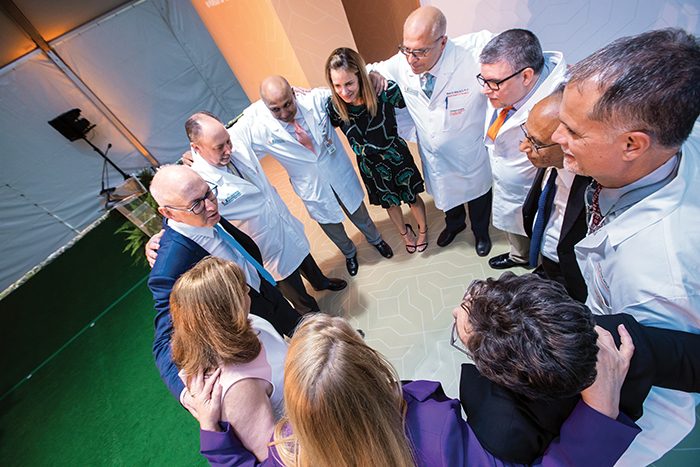Sylvester Comprehensive Cancer Center earned the coveted National Cancer Institute (NCI) designation in 2019, becoming the only NCI-designated cancer center in South Florida and one of 71 cancer centers with the distinction nationwide.
“NCI centers are the crown jewels of the nation’s war on cancer, and the standards are very high. It takes years of preparation and work, with strong leadership from the university, the state, and the community. We are looking forward to the new scientific advances and therapies you will provide,” said NCI Director of Cancer Control and Population Sciences Robert Croyle, Ph.D., commenting on Sylvester’s achievement.

NCI recognizes U.S. centers that meet rigorous standards for transdisciplinary, state-of-the-art research focused on developing new and better approaches to preventing, diagnosing, and treating cancer.
In the six years of preparation to apply for NCI designation, Sylvester’s team, led by Director Stephen D. Nimer, M.D., focused on specific areas to meet NCI’s high standards. Among those was changing the Cancer Center’s basic science and clinical research culture from one where researchers worked in silos to putting the emphasis on collaboration. Sylvester recruited some of today’s best and brightest researchers, clinicians, and educators, who continue to present important research findings at the major national meetings. And Sylvester focused on expanding its educational reach, including teaching and training oncologists throughout Latin America and the Caribbean.
Sylvester’s potential impact, commitment to excellence, collaborative culture, and expertise stood out to NCI. A key element for NCI designation is a center’s level of grant funding. Sylvester’s research programs have received a growing level of support from competitive federal and state grants, research contracts, and philanthropic contributions.
“Today, we have more than $30 million in peer reviewed funding, compared with $9.9 million in 2014,” Dr. Nimer said.

One of those is Sylvester’s Cancer Control Program, which aims to reduce the incidence of cancer and its impact on patients in the region.
“When I joined Sylvester, I wanted to understand why so many women from Haiti were dying from cervical cancer, a treatable disease,” said Erin Kobetz, Ph.D., M.P.H., one of the program’s co-leaders and the University of Miami’s vice provost for research. Dr. Kobetz, who also is professor of medicine and Sylvester’s associate director for population science and cancer disparity, said, “That led me into community-based, participatory research aimed at improving the quality of life for the people who live here. South Florida is thought to represent the future demographic of the United States, and our cancer control programs can serve as models for the nation.”
Another example with far-reaching effects, Sylvester’s Firefighter Cancer Initiative is a state-funded program launched in 2015 that is looking at why firefighters are at increased risk of developing and dying of cancer. The initiative has inspired a national dialogue by reducing exposure to carcinogens through education and by implementing evidence-based methods. More than 4,000 decontamination kits are being used by firefighters across Florida to help them clean up after responding to a call.
Sylvester’s Cancer Epigenetics Program studies modifications to gene structure that occur due to aging, the environment, nutrition, and other factors.
“Very few centers have programs dedicated to epigenetics,” said Maria E. Figueroa, M.D., one of the program’s co-leaders and associate professor of human genetics. “We are just at the beginning stages of learning how to edit or reprogram that software to correct mutations or metabolic problems that can lead to cancer.”
Sylvester’s Tumor Biology Program takes a broad, integrated perspective into cellular interactions within the complex biological landscape of tumors.
“With our diverse minority populations, the incidence of some tumors is higher than average,” said Wael El-Rifai, M.D., Ph.D., one of the program’s co-leaders, who is also professor of surgery and associate vice chair of the Department of Surgery. “We want to understand the mechanisms of tumor initiation and progression. This step is critical for developing a personalized treatment approach based on the characteristics of the tumor in each patient.”
Dr. Nimer and the leadership team have identified new research, clinical care, and outreach initiatives for 2020 and beyond. The five-year strategic plan features goals to increase the social and translational focus of the center’s research programs, develop and grow shared research resources, as well as launch a developmental therapeutics program.
“Giving new hope to the 7,000 to 8,000 new patients a year we see at Sylvester is incredibly rewarding,” Dr. Nimer said. “We will never relent in our quest for cures. The best is yet to come.”